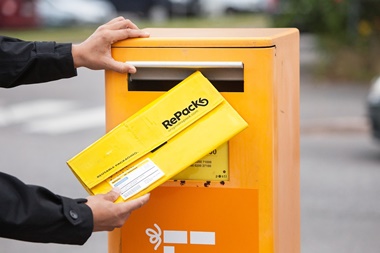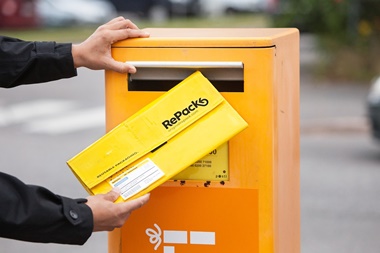It all started with plastic bags. From October 2015, all retailers in England with 250 or more employees were required by law to introduce a 5p charge for all single-use plastic bags. The move brought the country in line with existing schemes in Wales, Scotland and Northern Ireland, and arguably helped spark a wider national conversation about plastic pollution.
Concerns about our addiction to plastic have only grown since then. Television viewers were left shocked by the final episode of BBC documentary series Blue Planet II, presented by Sir David Attenborough, which showed animals ingesting plastic packaging. The UK government is now mulling a ban of plastic straws, cotton buds and drink stirrers in another attempt to tackle plastic waste.
Fashion retailers have a part to play in this battle against plastic, particularly as the explosion in online orders means an increasing number of products are sent to customers wrapped in layers of plastic and paper.
Fast fashion giant Zara, for example, now delivers its online orders in 100% recycled cardboard boxes made from boxes previously used in stores. The outer bag that protects the boxes is made from 55% recycled plastic.
Asos, which sources more than 40 million plastic mailing bags and 5 million cardboard boxes a year for its orders, has introduced a range of packaging initiatives, including using bags made from 25% recycled content and fitting more parcels on delivery vehicles at a time.
But is there more that retailers could – and should – be doing when it comes to reducing packaging waste?
Sweet solution
Womenswear retailer Pink Boutique is another fashion business taking a stance on packaging. Last month, it switched from polythene mailing bags to a greener alternative made from sugarcane via packaging supplier Duo. As well as being a water-efficient crop, sugarcane absorbs carbon dioxide as it grows. The finished sugarcane bag is 100% recyclable.
“We try to be as sustainable as possible in everything that we do and I felt uncomfortable about the number of plastic bags we were using,” explains Pink Boutique finance director Julie Blackie (pictured at the top of the page with Anthony Brimelow, commercial director at Duo).
“We were doing a rebrand anyway and I started looking into ways we could be more environmentally friendly.”
Cost concerns are often one of the barriers preventing retailers from embracing sustainable initiatives across their businesses, particularly given the current challenges facing the UK high street. Blackie says there was a price increase associated with using the recyclable sugarcane mailing bags over traditional polythene, but that Pink Boutique was able to negate the increase in cost by being more economical with the size of the mailing bag it uses.
“The cost of the sugarcane bags was about 25% more than what we were paying before, but we looked at all the sizes we were using and then restructured the size range to get the economy we needed,” she says. “As a result, we’re not paying more – we’re just being more economic about how we use the bags.”
Zoe Brimelow, brand director at Duo, which manufactures the sugarcane bags used by Pink Boutique, argues that retailers need to find creative ways to convey sustainability initiatives to customers.
“Once a retailer has made the choice to use a sustainable source, it is also about how it communicates that to customers,” she says. “That is something Pink Boutique has got right with the branding on the new bags that says: ‘give me some sugar’. It fits with the brand, but helps the consumer understand that the retailer is making a better decision.”
We’re trying to develop ways of delivering clothing without plastic packaging at all
Designer Oliver Spencer
British designer Oliver Spencer has also been tackling waste at his eponymous menswear label. The brand has reduced the amount of packaging it uses by 30% for autumn 2018, although Spencer admits there are challenges depending on different products.
“We’re trying to develop ways of delivering clothing without plastic packaging at all,” he tells Drapers. “All of our packaging has been stripped back to the bare needs now – we’ve even taken away the rice paper that had our brand name printed on it. We use recycled paper and recycled bags. The big thing for us is delivering a shirt without using plastic at all, so that’s something we’re working hard to deliver.”
Spencer does not mince his words when it comes to why the brand is rethinking packaging: “I don’t think customers want all the crap that we send them. There’s too much plastic and I think it is in our customer’s DNA to think about sustainability.”

RePack returning
RePack’s sustainable packaging
Back again
Another initiative looking to reduce waste in the fashion industry is packaging service RePack, which aims to provide online retailers with a simple solution to waste. It currently works with brands including Swedish label Filippa K and sustainable denim company MUD Jeans, and sends customer orders in reusable and returnable packaging. The packaging comes in three adjustable sizes and is designed to last at least 20 cycles.
Brands can choose to send all their orders in RePack packaging, or offer customers the opportunity to choose sustainable packaging at checkout. Shoppers can then return the packaging for free by post, and are offered an incentive or reward for doing so. RePack is currently setting up a UK logistics hub to enable it to work with British retailers.
“As more and more shopping is done online, customers are faced with excess packaging that infiltrates their homes and very quickly becomes a nuisance,” explains RePack chief executive and co-founder Jonne Hellgren. “Retailers need to meet the needs of the changing consumer, particularly as concerns over plastic are more apparent than ever.”
The increase in online shopping, shoppers’ green demands and tight margins: retailers will have their work cut out to satisfy all three, but they must if they hope to thrive in a competitive market.

